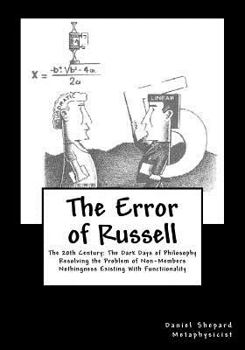The Error of Russell: Resolving the Problem of Non-Members
This essay will begin where we, humankind, have lead ourselves as we attempted to slash our way through the jungle of life's seemingly endless paradoxes. These paradoxes, which life has persistently thrown across our path, are signposts for us. They are indicators that we do not have all the answers. They warn us to beware. They warn us there is something wrong with our perception of life; there is something wrong with our thinking. They have a function of their own, they direct us towards a state of understanding where we are, what we are, and why it is we exist. In this essay, we will be attempting to understand the likes of Russell, Wittgenstein, Frege, Plotinus, and back again to Russell as we attempt to move past parts of Heidegger. Our objective will be to step back in time in order to get back to today. What is the point of going to all this trouble just to get back to where we started? The point is to bring back with us a new perception regarding a simpler solution to Russell's paradox. Why is this important? Presently we have a solution to Russell's paradox, which involves a complex understanding of 'separation through exclusionism', which in turn represents what we do to people in society. We separate individuals and groups from our own groups and ourselves. Once having separated them from ourselves we exclude them from ourselves through a process of rejection, exclusionism, and separation. It is Russell's paradox, which provides the key to rectifying these constant actions of rejection. For this reason we will accompany Russell as he travels eighteen hundred years back in time. This trip will allow us to bring back with us a different solution to Russell's paradox. This trip will allow us to bring back a process known as 'separation through inclusion'. Now the name would seem to imply our creating a paradox to act as a solution to Russell's paradox but as we shall see it does nothing of the kind. What it does is allow us to find a much simpler solution to Russell's paradox. 'But what does this concept of 'separation through exclusion' as opposed to 'separation through inclusion' have to do with me?' you may ask. The process provides an alternative means to resolving a fundamental paradox of mathematics, which in turn can be applied directly to the process of understanding life. It is the simplistic resolution of complex paradoxes, which provides us with a simplistic understanding of life. It is through this process that we shall see 'Ockham's razor not only cuts away the complexity of science but becomes the primary tool for Husserl's bracketing . Ockham's Razor now becomes not only a principle axiom for science but now moves on to become a principle axiom of philosophy. This is an essay beginning in complexity and ending in simplicity. Why is it that we must begin in complexity rather than begin at the logical point of origin, the point of simplicity? We begin in complexity for it is through complexity that we presently have begun to understand Russell's paradox . Presently we have solved Russell's paradox in a complex fashion. This has led us to understanding life in a complex manner. We cannot understand the simplicity of life as long as the basics remain complex. The solution to this problem lies in the understanding of Russell's paradox. Once you understand the end of this essay, you will begin to understand why it is that we must go back and make a correctional adjustment to our journey as individuals and as specie. The question becomes, 'How far back in time must we travel to do all this?' We must go back 1700 years. Who will lead us on this backtracking expedition? The honors will go to Bertrand Russell himself. Russell verbalized the paradox in 1901. As such, it is Russell's paradox. Therefore, it will be Russell who will lead our backtracking expedition, which will lead us to an understanding of life.
Format:Paperback
Language:English
ISBN:1466399104
ISBN13:9781466399105
Release Date:October 2011
Publisher:Createspace Independent Publishing Platform
Length:108 Pages
Weight:0.44 lbs.
Dimensions:0.2" x 7.0" x 10.0"
Related Subjects
PhilosophyCustomer Reviews
0 rating





